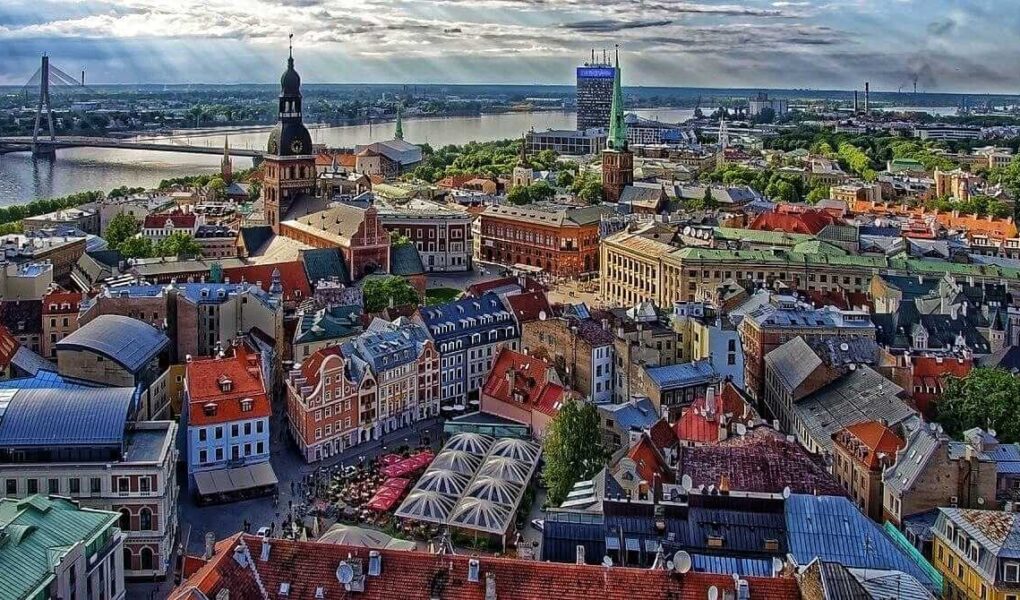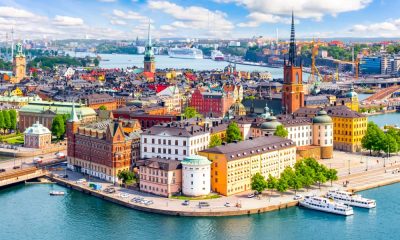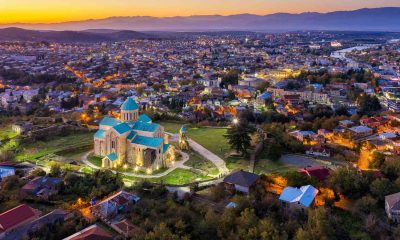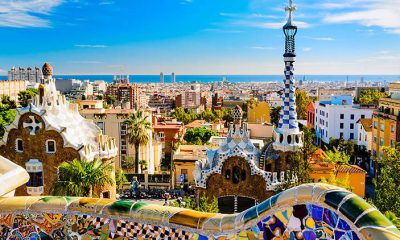Visa
Easy Guide On How To Move To Latvia

Latvia is a fantastic blend of old and new, providing a memorable expat experience. Despite its remote location, this Baltic country boasts breathtaking natural beauty and a rich history. The country has a population of approximately 2 million people, making it one of the EU’s smaller countries.
Facts About Latvia
| Capital city | Riga |
| Official language | Latvian |
| Currency | Euro |
| Population | 1.9 million |
| Government | Parliamentary Republic, Part of Nato and the EU since 2004. |
| Ethnic makeup | Latvians 62.5%, Russians 24.7%, Belarussians 3.1%, Ukrainians 2.3%, Poles 2%, Lithuanians 1.1%, others 4.1%. |
| Emergency number | 112 |
- Who Can Move to Latvia?
Anyone can move to Latvia. Nevertheless, the relocating process will be determined by your nationality.
- If you are a national from the following countries, you are not required to apply for a visa to enter the country:
- You are a citizen of an EU/EEA or Schengen country.
- You are a citizen of a country with a visa-free agreement with Schengen.
- If you are a citizen of countries that does not have a visa-free agreement with Latvia, you must apply for a visa to enter Latvia and move there.
How Can I Move to Latvia as an EU Citizen?
EU, EEA, and Swiss citizens do not require a visa to enter Latvia. However, if they enter the nation and want to stay for more than 90 days, they must follow the requirements below:
- Register with the Office of Citizenship and Migration Affairs (OCMA) to prove they are either:
- Employed or self-employed in Latvia.
- An employee or service provider of an EU-registered company.
A student. - Prove their address in Latvia by presenting a document such as a rental or a lease agreement.
Note: EU nationals can also register their partner or spouse and children.
- How Can I Move to Latvia as a Non-EU Citizen?
If you are a non-EU citizen, you have various alternatives for relocating to Latvia. You can relocate there for a variety of reasons, including employment, education, business ownership, retirement, and investment in the country. Depending on the cause for your move, you must first apply for an appropriate long-stay (D) visa, followed by a residence permit.
Moving to Work
If you wish to move to Latvia and work, you must first obtain a work visa. A Latvia work visa is a national visa that is frequently provided simultaneously with a work permit and a residency permit. Before coming in Latvia, you must apply for a temporary residency permit from the Latvian embassy.
After you enter the nation, you must register with the Office of Citizenship and Migration Affairs (OCMA). The stay is for up to five years, with the potential of extension.
You can also apply for an EU Blue Card if you are one of the job seekers who are highly qualified. You must meet the following conditions to apply:
- You must have an agreement in place with an employer in Latvia offering you employment and an invitation submitted to the
- Office of Citizenship and Migration Affairs (OCMA) by the employer.
- Five years of professional experience in the industry or academic experience of at least three years in a program related to the intended employment industry.
Moving to Study
Another alternative for moving to Latvia is to study there. First, you must apply for a student visa. The visa is normally valid for the duration of the study program, which might range from six months to a year.
Upon your arrival in Latvia, you must get a temporary residency permit. Your initial student visa allows you to stay in the country for a maximum of six months. To obtain your permit, you must register your place of residence with the local Office of Citizenship and Migration Affairs (OCMA). You must register only if you remain for more than 90 days.
- Moving to Retire
Another reason to relocate to Latvia is to retire. To visit the nation, you must apply for a retirement visa, which is valid for up to five years. You can enter and live in Latvia if you have enough money and have attained the official retirement age. Currently, Latvians retire at the age of 65.
After arriving in Latvia, you must apply for a temporary residence visa, just like with any other type of relocation. Residence permits will be issued by the Office of Citizenship and Migration Affairs (OCMA). In addition, elders in Latvia must renew their residency licenses every five years. As a result, you must submit your application as usual.
- Moving for Family Reunification
Obtaining a family visa may be required if you want to reunite with family members who are Latvian citizens or residents. You are eligible for a Latvia family visa if:
- A spouse or partner of a Latvian citizen or foreigner with a Latvian residence permit.
- A spouse/partner or minor child of foreigners with a Latvian temporary residence permit.
- A child (adult) of Latvian nationals.
- The parents of Latvian citizens or foreigners with a Latvia residence permit.
- A foreigner who is a direct descendent of Latvian citizens.
After arriving in Lativa, you must apply for a temporary residence permit and register your residency with the Office of Citizenship and Migration Affairs (OCMA). If you do not complete the registration, you will have to pay a fine.
- How Do I Become a Long-Term Resident?
After five years of valid and consecutive presence in Latvia, third-country nationals will be eligible to apply for long-term residence status. After becoming a long-term resident, you can travel visa-free across the Schengen area, and after one year of working in any EU nation, you will be entitled to apply for a residence permit there.
- Can I Apply For Latvian Citizenship After Moving to Latvia?
An applicant can gain citizenship after five years of legal residency in Latvia if they were a permanent resident for five years before to applying. To be eligible for citizenship, the candidate must also have physically resided in the country for at least four of the previous five years.
- Does Latvia Allow Dual Citizenship?
Latvia doesn’t allow dual citizenship. If you have Latvian ancestry, you may be eligible for dual citizenship.
- Can I Move My Belongings to Latvia?
You can transport your belongings to Latvia via shipping. International shipping businesses are the most helpful in getting your stuff into the country. Shipping times vary depending on the place of origin and the European transportation constraints imposed by Covid-19. There will be no tax restrictions while relocating within the EU. However, imagine you are moving from outside the EU. In this situation, import and other taxes will apply:
- Clothes and other necessities are not taxes, but personal property such as household items can be applied for tax exemption.
- Items you have had less than six months will be liable to tax and import duties.
Can I Move to Latvia With Pets?
You are welcome to migrate with your pets in Latvia. However, the pets will be subject to certain criteria. Your dog, cat, or ferret should be:
- Micro-chipped or have a legible tattoo (if applied before 3 July 2011).
- Vaccinated against rabies.
- Treated against the tapeworm Echinococcus multilocularis (where necessary).
- In possession of a valid European pet passport (if traveling within the EU) or an EU animal health certificate (if traveling from a non-EU country).
Fun fact: Cats are the most common pets in Latvia, and 38% of households have one, the second highest number in Europe.
- What Are the Pros and Cons of Moving to Latvia?
Before going to Latvia, you should assess if it is worthwhile to live there—the benefits and cons listed below may help you decide:
| Pros | Cons |
| Cost of living— compared to other European countries, the cost of living in Latvia is relatively low. But the cost will vary depending on the city you choose to move to. In most cases, the cost outside of Riga will be cheaper. | Limited job opportunities— Latvian residents go to more developed countries to work. Popular vacancies in Latvia for foreigners are international drivers (truck drivers), engineers, construction workers, and programmers. In addition, since the Covid outbreak, the job market has fluctuated. |
| Fast and affordable internet connection— in terms of broadband connectivity, Latvia ranks 4th among EU countries. Most of the country is covered with a speedy and stable 4G connection, and the average mobile internet speed is 48.41Mbps. | Low salaries— in terms of wages, Latvia is the last in Europe. The minimum wage is €500. This has resulted in many young graduates leaving the country for other EU countries searching for jobs. |
| Transportation— public transportation is extremely affordable and buses, trams, trolley-buses, and minibusses provide the services. The cost of public transportation is €1.15 if purchased in advance and €2 if the tickets are from the driver. | Crime— one of the biggest challenges for Latvia is organized crime. |
| Affordable healthcare— the healthcare system in Latvia is a mix of private and public-funded services. Publicly funded services are available to permanent residence permit holders, though there may be a waiting list. | Cold winters— Latvia has a temperate oceanic climate. The winters are long, cold, dark, wet, and gray. The winter temperature fluctuates between 22°F (-5.5℃) and -22°F (-30℃). |
| Part of the EU— being part of the EU means that the nationals of Latvia can move freely and work in other EU countries. |
- What Are the Most Popular Areas in Latvia for Expats?
Some of the most popular areas in Latvia for expats include:
- Riga
- Jurmala
- Sigulda
- Daugavpils
Riga
Latvia’s capital and largest city is Riga. This thriving metropolis is home to a diverse range of enterprises, arts institutions, and cultural attractions.
Furthermore, Riga has a thriving nightlife culture, making it an ideal destination to party and meet new friends. The average living costs in this city varies significantly from those in other cities, especially in the property market. When you move to Riga, you will most likely find that the cost of living is lower.
- Jurmala
Jurmala is the largest resort city along the Baltic coast. With its 24-kilometer-long beach, proximity to the sea, and lovely wooden buildings, the city offers a distinct aura. It was founded at the same time when Europe discovered the healing qualities of the sea, and the first resorts were established. Furthermore, the annual Jazz Festival is one of the town’s most popular events.
- Sigulda
It is home to various historical sites, including the Sigulda Castle and the Gutmanis Caves. Sigulda, a setting surrounded by nature, allows tourists to study three medieval castles, trek in Gauja National Park, and attend cultural and sporting activities.
- Daugavpils
Daugavplis is the second-largest city in Latvia. The city has several historical sites, including Daugavpils Castle and St. Peter’s Church. Furthermore, the Daugava River allows people to swim, fish, and boat.












